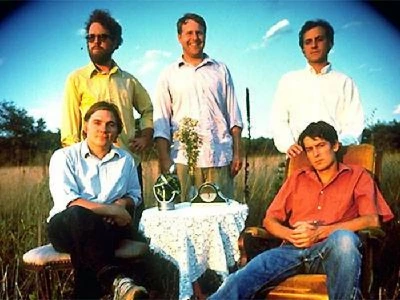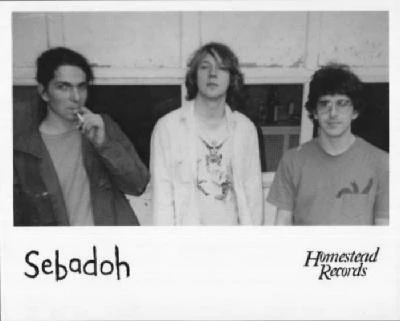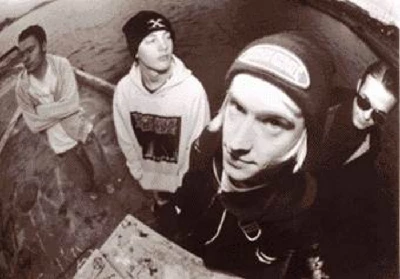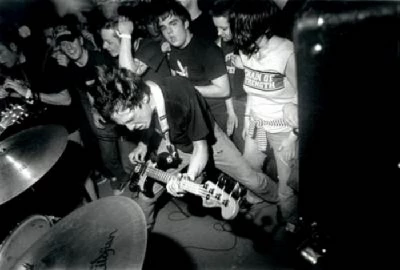Miscellaneous
-
Part 3-The Changing Face of Punk Rock : 1994-
published: 14 /
3 /
2003
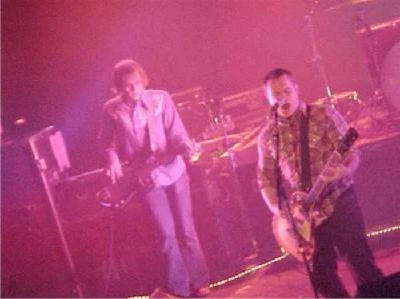
In the third and final part of his series on American hardcore punk, Mark Rowland examines the years between 1994 and the present day
Article
So, twenty years on since hardcore punk's peak, is it still as relevant today as it was then? It certainly is. Hardcore has now divided itself into several different sub-genres which have all evolved from hardcore punk, but have all headed in very different directions.
Despite having perhaps the most redundant name for a genre of all time, theEmo movement, has produced some really great music, from the poppy Get-up Kids to the more aggressive Small Brown Bike. The term 'Emo' was created to describe the music of punk and hardcore bands whose songs tended to be about relationships and broken hearts rather than politics and anger. The sound of the music also has its own distinctive features, and is likely to feature choppy rhythms, lots of melody lines played on guitars, and soppy songs about girls.
One of the best albums of the genre is Far's 'Water and Solutions', a very, very near perfect combination of rock guitars and beautiful melody, with post-hardcore rockers like 'The System' and 'Wear It So Well' rubbing shoulders with gentle, positive songs like 'Really Here' and 'Waiting for Sunday', but it's the combinations of these two styles on tracks like opener 'Bury White' and 'I Like it' that are the albums best tracks. Actually, no, every track on this album is brilliant, from the quirky subtlety of the title track to the punky adrenaline shot that is 'Mother Mary'. 'Water and Solutions' is one of the essential albums to be classed as Emo.
For the more Fugazi influenced side of Emo, Small Brown Bike's second album 'Dead Reckoning' is a good place to start. Most of the songs on this album are pretty hardcore, with a stop-start wall-of-guitar sound, and rough, MacKaye-esque vocals. Luckily, they also know how to write a good tune. Listen to this album, and you'll be surprised to hear yourself singing along to 'A Future with No Friend', 'My Own Disaster', and especially 'See You in Hell'. And, of course, all the tracks feature some great riffage. It is however, a bit same-y, as most of the tracks are overtly punk.
At the other end of the spectrum, The Get Up Kids' 'Something to Write Home About'is one of the best Emo-pop albums available. This is basically very good punk/guitar-pop, which is given greater texture with supporting keyboards and vocal harmonies. Pop-Punk opener 'Holiday' is an obvious stand-out track, as is the first single off the album, 'Action and Action', the acoustic 'Out of Reach', the charmingly innocent 'Valentine', or their compulsory Emo break up song 'Ten Minutes'. 'Something to Write Home About' is the soundtrack to an Emo summer with bright, poppy, sensitive songs.
There are plenty of other great Emo albums and bands, but there are too many to mention every one. As a starting point, these three albums are pretty damn good, though 'Water and Solutions' is a definite must have.
A lot of bands emerging at the tail end of the Hardcore punk scene have taken the D.I.Y. ethic to it's limits with Lo-fi music. At the forefront of this scene are Pavement and Sebadoh. Ok, so both bands formed in the early 90's, Sebadoh haven't released anything for ages, and Pavement have split up, but they need to get a mention somewhere.
Pavement were formed by singer Stephen Malkmus and guitarist Spiral Stairs (a.k.a. Scott Kannenburg) at the very end of 80's. After a string of EPs, their debut full-length, 'Slanted and Enchanted', released in 1992, turned out to be a classic, featuring all quirky, fuzzed up songs, with a great underlying sense of pop melody. The music borrowed from the American alt scene, but also took from British post-punk bands like the Fall and the Swell Maps. The band's melodic sensibilities came to the foreground a bit more on 'Crooked Rain, Crooked Rain', their second album, which featured what is probably Pavement's most famous song, 'Cut Your Hair', probably the best song about getting your hair cut ever written.
The next and last essential Pavement album, 'Wowee Zowee', is possibly their greatest achievement. Across it's 18 tracks, you'll find everything you ever wanted in a band: 'Father to a Sister of Thought' has a country tinge which is supplied by a steel pedal guitar : 'Serpentine Pad' is pure post-punk noise perfection ; 'Grounded' has a subtle yet catchy straight tune, while 'Brinx Job' is a bizarre little number with some nice Wah-wah guitar. Every track is quite different from the next, but they're all very Pavement. To be honest, you can't really go wrong with any Pavement album, but, while they would release others, these three are the best by far.
Sebadoh's story is a similar one to Pavement's. The band was formed by Lou Barlow, formerly of Dinosaur Jr, and Eric Gaffney, a key figure in the Massachusetts hardcore scene. Starting off as a basically acoustic project, the addition of Jason Lowenstein transformed the Sebadoh sound into a punkier, more band based one, which was showcased on the EPs 'Rocking the Forest' and 'Sebadoh vs. Helmet'. Both these EPs have now been put together on one CD, and many of the songs also feature on 'Smash your Head on Punk rock', Sebadoh's sound has become more studio based since then, producing the equally brilliant albums 'Bubble and Scrape', 'Bakesale' and 'Harmacy', amongst others, but the band have been put into a temporary hiatus due to being dropped by their label.
These are two of the obvious lo-fi bands, but there are tonnes of amazing lo-fi bands that are a lot harder to find. Band's like San Diego's Truman's Water and their British kindred spirits I'm Being Good make great noisy, twisted lo-fi music that has become known as squigglecore, which is a style that's threatening to become a genre of it's own.Truman's Water's 'Spasm smash Xxxoxox Ox and Ass' and I'm Being Good's 'Poisonous Life' are both lo-fi mini-masterpieces.
Other bands take a more acoustic direction, Like Will Oldham and his Palace Brothers and Bonnie 'Prince' Billy projects, and Conor Oberst's Bright Eyes. Both excel in making quirky country-folk music. Heading in a slightly weirder acoustic lo-fi direction, Daniel Johnston and Frogs make great little nuggets of oddness, and both have been praised by people like Sonic Youth and Kurt Cobain.
Daniel Johnston has been in and out of insane asylums for most of the nineties, but has still managed to be quite prolific, producing many albums weird mainly acoustic based, pretty songs, that stand-out from most folky bands because of Johnston's varied and often strange subject matter and his brittle whimper of a voice.
The Frogs also make strange acoustic music, but tend to tell odd stories with their songs. Their trademark album, 'It's Only right and Natural', is mainly comprised of songs from the perspective of the gay community, with tracks called things like 'Hot Cock Annie', and 'These are the finest Queen boys (I 've ever Seen)'.
Many hardcore bands towards the end of the 80's realised the similarities in hardcore punk and metal, and started incorporating metal elements into hardcore. The resulting metal-core scene has mainly produced uninteresting meat-head music, but recently, some bands have taken it in more interesting directions.
Refused are one of these bands. Always a more intelligent band than a lot of their peers, they sport a heavy sound without sounding overly macho, and write about political and social issues that interest them. It's their third album, 'The Shape of Punk to Come' where
they really made their mark, incorporating electronics, vocal samples, and just better songs. The key track on the album is 'New Noise', a sprawling 6 minute hardcore masterpiece with a great build up, intense vocal delivery, and a great use of a crowd sample. Elsewhere, the album ranges from subtle tracks like 'Summer Holidays vs. Punk Routine' and 'Liberation Frequency' to Hardcore with jazzy drumming and stand-up bass ('Deadly Rhythm'), and this got the band's name down in history as one of the best 90's hardcore bands.
A band that has come into the spotlight over the past year is the Dillinger Escape Plan, a band unafraid to take metal and hardcore into new and interesting places. Their only full-length album to date, 'Calculating Infinity', is very noisy but technically accomplished, incorporating jazz, frequent difficult time changes and ambient sounds into the metal-core sound. Initially, it's difficult to stomach, but listen to it a few more times and their songs start to make sense. The best track on the album is '43% Burnt' a typically sprawling piece which is basically a really noisy love song. The band's recent collaboration with Mike Patton on the EP 'Irony is a Dead Scene', is slightly more accessible, though not much more, but it is just as great, and worth owning just to hear Dillinger's amazing drummer Chris Pennie pull off the complex drumming of Aphex Twin's 'Come to Daddy'pretty much EXACTLY as it is on the original, which is bloody impressive.
The Blood Brothers, who've been getting quite a bit of press attention this year, aren't really metalcore, but they do share some traits with metalcore bands. Their music is pretty noisy, and also uses jazzy intervals and time changes to a lesser extent than Dillinger, but also have art-punk influences, which is what really sets them apart. The band's two singers, Jordan Billie and Johnny Whitney, have equally frenzied but quite different vocal styles, which is another distinguishing feature of their sound, and the band occasionally diversifies their sound by using electric organs, pianos, and the odd glockenspiel. 'March On Electric Children' and new album 'Burn, Piano Island Burn' are their best works to date.
So, finally, there you have it, a brief history of American punk, in three parts. Hopefully, you've all learned something, and want to find out a lot more about the bands mentioned in the series, or made you want to listen to the records again. Punk rock is constantly changing and reinventing itself, taking in new things and keeping itself alive. Where it goes next is anyone's guess, but I'm sure that whatever it becomes, it'll be great. Of course,sometimes it changes for the worst (hello, Sum 41) but real punk rock doesn't try to change to make money rather than make music that means something.Real punk does what it wants, and if people don't like it, then so be it. Luckily, a lot of people do.
Picture Gallery:-
